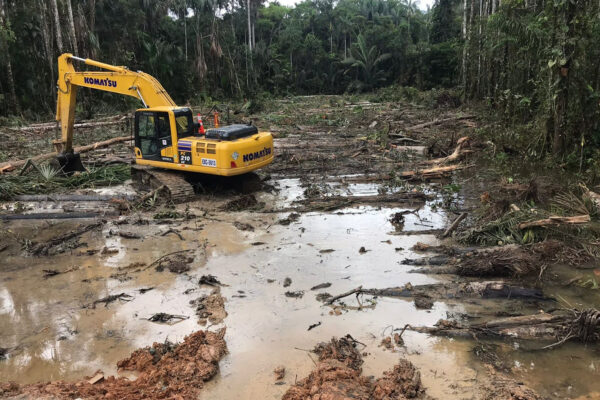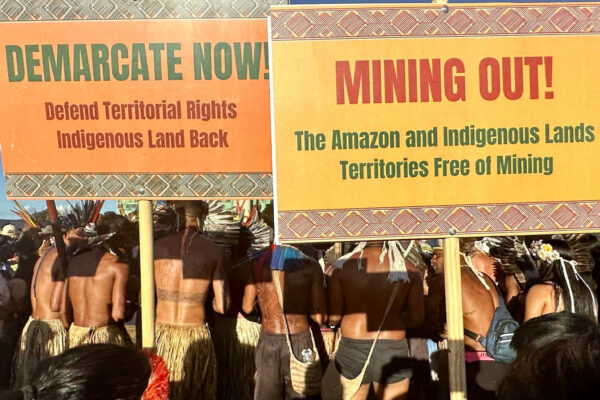While critics have unanimously agreed that the visual spectacle that is James Cameron’s Avatar is beyond compare, there has been less enthusiasm for the plot line, which has been called out as flat and unoriginal.
It’s quite true that the movie’s script – which centers on a tribe of indigenous creatures whose ancestral arboreal homeland is being destroyed by contracted soldiers in service of a resource extraction company – has its weak points, perhaps most notably the endless stream of one-liners that emanate from the film’s primary antagonists: corporate evil bad guy Parker Selfridge (played by Giovanni Ribisi) and the muscle behind his operation, Col. Miles Quarritch.
In one memorable moment, Ribisi’s character (who apparently keeps a hovering chunk of the hilariously yet somewhat profoundly named mineral “Unobtanium” on his desk at all times just so he can explain its purpose to those of us who may not know) says: “Killing the indigenous looks bad.” In another, he says: “They aren’t people, they’re savages” while his Colonel sidekick says: “Let’s scatter the roaches… I want to be home before dinner.”
While it’s easy to smirk at lines like this and dismiss them as boorish screenwriting, the sad truth is they actually hit much closer to home than one might think. The history of colonialism and destruction of indigenous peoples brings with it a panoply of one-liners and inhumane vernacular that would make even Cameron cringe.
In the 1990s, Freeport-McMoran mining company blasted the top off a mountain in West Papua, poisoned the water supply of thousands of indigenous residents, hired Indonesian soldiers to “protect” the mine from any insurgents, and quite possibly had two of the tribal leaders killed. The notorious CEO of Freeport, JimBob Moffett, was later quoted as saying that “the environmental impact of my mine is equivalent to me pissing in the Arafura sea.”
Chevron spokesman Don Campbell, speaking about a lawsuit filed against the company by 30,000 indigenous and peasant farmers in Ecuador over the systematic rape, destruction, and poisoning of their land, told a reporter, “We’re going to fight this until hell freezes over, and then we’ll fight it out on the ice.”
The same company’s corporate lawyer, in Joe Berlinger’s powerful film Crude, sits on camera with a stone face while looking at pictures of tumor-addled children and exclaims that there is no evidence that oil contamination causes cancer and blames the cancer on the indigenous people themselves because of their lack of hygiene.
Slightly more to the point is Christophe de Margerie, CEO of French oil company Total, who in August of last year bluntly said that critics of Total’s destructive operations in Burma can “go to hell.”
Historically, the vernacular of colonialism has followed a consistent track of smug superiority, debasement, and dehumanization, putting – as Ribisi’s character does in Avatar – particular emphasis on the word “savage.”
The British used the word with relish, alternately using it to refer to every one of their conquered peoples, starting with the Scots and the Irish and then moving briskly through the Middle East, Africa, and Asia. In 1919, after slaughtering 349 men, women, and children in Amritsar India, British Brigadier General Reginald Dyer still maintained that Indians were savages who would “never be enlightened.”
Yes, 1919 was a long time ago – relatively. But as late as 1983, in my hometown of Santa Fe, New Mexico, the town’s central monument honored Don Diego De Vargas’s victory over the “savages” (during which twelve native chiefs were hung in the public square). This victory was commemorated every year – until it was finally stopped several years ago – by a Fiesta parade in which a man dressed in Native garb was paraded around the town in chains.
Most recently, in Peru, after police attacked indigenous protesters in the Amazon basin, killing over a dozen and injuring several hundred, Peruvian President Alan Garcia demonstrated his overt hatred of the indigenous by characterizing them as “savage and barbaric.” He went on to say that: “These people don’t have crowns….These people aren’t first-class citizens.”
While the word “savage” is debasing and degrading, it still denotes some level of humanity in the native. When the United States Army detonated a series of nuclear bombs on Rongelap Atoll in the 1950s and then moved the indigenous people back to the blast site in order to measure the effects of radiation on test subjects, for example, it stated, “While it is true that these people do not live the way civilized people do, it is also true that they are more like us than the mice.”
The next level of debasement is to dehumanize altogether, i.e. to compare people who are about to be killed to insects or other lower life forms. During the Rwandan genocide, less than two decades ago, Rwandan Public Radio was calling on all law abiding Hutus to “exterminate the cockroaches,” a mandate that makes Colonel Quarritch’s one-liner about insects seem not so outlandish after all.
Such evil-speak is not the stuff of Hollywood fancy. It is the true life vocabulary of people who do unimaginable things. The real reason we find one-liners like this so laughable in movies is not always that they are cheesy, it’s that most of us – in a post-modern and somewhat self-aware world – cannot even conceive of a mentality that would utter such bile. Sadly, such bilious people are not only still out there, they are thriving.
In one of Avatar’s climactic battle scenes, a massive robot-driven machine chews up and spits out forest while helpless natives fire upon it with puny bows and arrows. Such is the exact fate of the Penan, who, as this is being written, are blockading roads with fallen trees and firing blowguns at Caterpillars in order to stave off the same destruction faced by Cameron’s fictional Na’Vi. The indigenous tribes of Peru’s Amarakaeri Communal Reserve face a similar fate.
And less than a month before Avatar’s release, two Salvadorans, including a woman who was 8 months pregnant, were assassinated for protesting the El Dorado Gold Mine. The instances in which Cameron’s film mirror reality are far too many.
Avatar certainly has a few low points. But for those critics who wished for fewer one-liners and evil caricatures in the film: Maybe we should wish for fewer of them in the world first. Because they’re still out there, and they’re still speaking the language they’ve always spoken. If James Cameron – and the rest of us – want to do something about it, lets start today.













